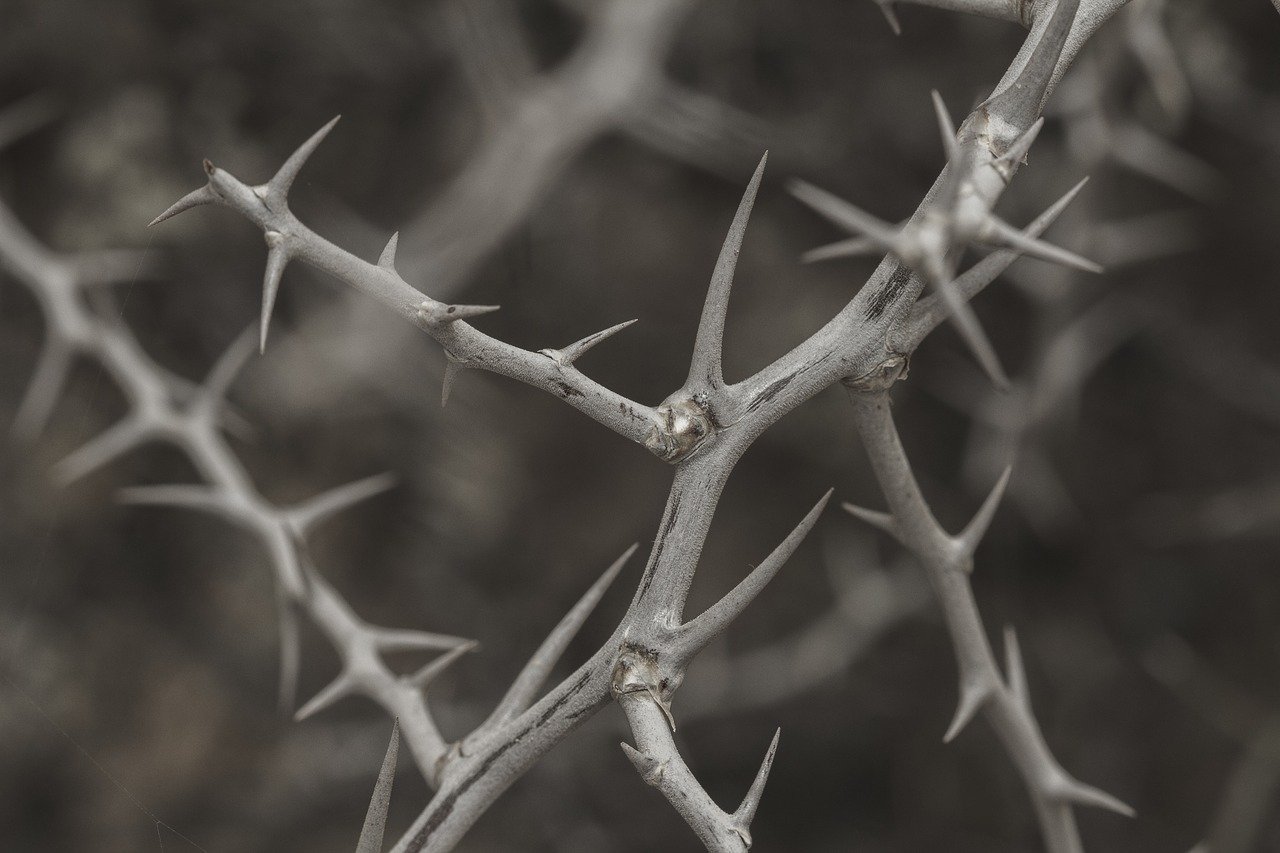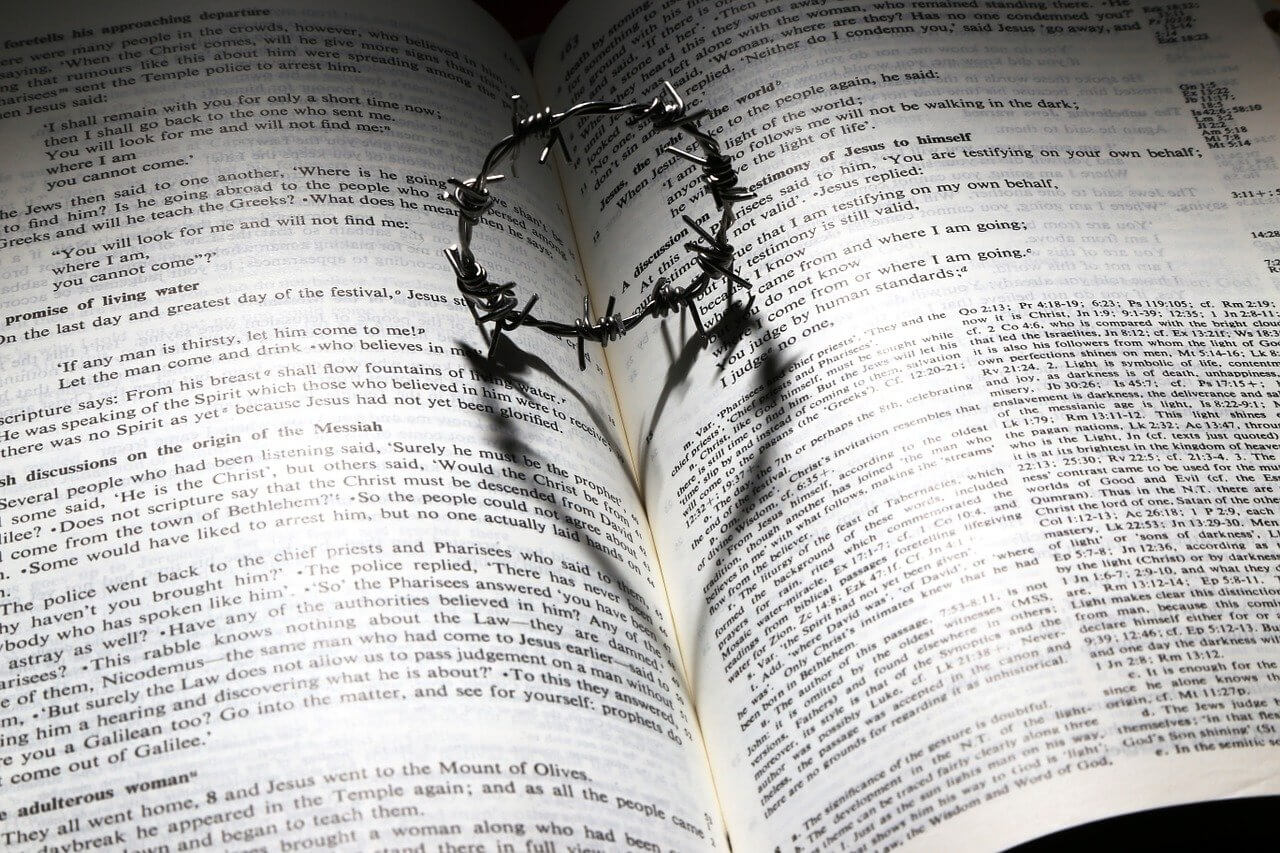Some of the most conspicuous vegetation especially around the second week of July in Israel are thorns and thistles. These grow in the fields, along the roads, and at times on the edges of wheat fields and barley. Some farmers would use thorns as a border to guard their harvest.
The Bible drawing from this background talks of thorns in different context. For some, it may refer to barriers, to others curses, and in some context enemies.
What You'll Learn Today
Symbol of Earthly Cares

In the parable of the sower also known as the parable of the soils, Jesus explains the reception of God’s word into the hearts of people.
He describes the story of a farmer who sows by scattering seeds indiscriminately. The seeds fall on different surfaces, some on rocky grounds, others by the wayside, others on good soil, and some among the thorns.
The seeds that fell among the thorns grew to a certain level and later choked by the thistles. To ensure that his disciples understand the parable, Jesus goes ahead to explain each of the soils on which the seed which represents the gospel fell.
In Matthew 13:22, the Bible says this about the thorny soil:
“The seed falling among the thorns refers to someone who hears the word, but the worries of this life and the deceitfulness of wealth choke the word, making it unfruitful.”
The Bible admonishes us to put earthly cares away from us. These are burdens that not only weaken our human nature, but also fill our lives with anxiety. For us to be fruitful in the ministry, we must receive the good news with hearts that resembles the good soil.
The Symbol of a Curse
It is interesting to note that thorns have been depicted as part of a curse connected with the sins of men. In the first mention of thorns in Genesis 3:17-18, the Bible says:
“Then to Adam He said, “Because you have listened to the voice of your wife, and have eaten from the tree about which I commanded you, saying, ‘You shall not eat from it’; Cursed is the ground because of you; In toil you will eat of it All the days of your life. Both thorns and thistles it shall grow for you; And you will eat the plants of the field.”
Symbol of Individual Identities
In the Gospel according to St. Matthew, we come across Jesus giving the sermon on the mount. This is a collection of teachings and sayings where Jesus was emphasizing the moral teaching of the gospel to the people who had gathered.
It was a time where false prophets were rising, and Jesus was teaching his followers how to identify them.
He begins by talking about the sheep and the wolves then grapes and figs, and later thornbushes and thistles. All these were common sights in Israel, and they were problematic to farmers.
Jesus insisted that the way to identify the false prophets is through the fruits that they bear. This meant the outward manifestation of the faith resident in a person.
In Matthew 7:16, the Bible says:
“By their fruit you will recognize them. Do people pick grapes from thornbushes, or figs from thistles?”
While in some instances the thistles and thornbushes refer to the pharisees, in most instances, it refers to false Christian prophets.
Symbol of Divine Restraint

In one of the mostly referred verses of scripture, 2 Corinthians 12:7, the Bible says,
“Because of the surpassing greatness of the revelations, for this reason, to keep me from exalting myself, there was given me a thorn in the flesh, a messenger of Satan to torment me—to keep me from exalting myself!”
The thorn in Paul’s flesh was a divine restraint allowed by God to prevent him from becoming conceited. Inasmuch as it felt uncomfortable or torturous at times, the thorn in the flesh of Paul kept him on the straight and narrow. We know that we do not serve a tormenting God, but one who loves and cares for us.
They were so many things Paul could have been proud of including the many visions and revelations that he received from God. However, the thorn in the flesh always reminded him that it is not about him but the Lord.
A Symbol of Worthless Fellows
In the Book of Judges Chapter 9, Jotham who was the youngest of 70 sons of Gideon and whose name means Yahweh is perfect, warns Israel about Abimelech.
Abimelech whose name means my father is king, was a son of Gideon. According to the Bible he often engaged in ways with his subjects, he was an ambitious and unprincipled ruler.
In Judges 9:13-15, the Bible says,
“But the grapevine also refused, saying, ‘Should I quit producing the wine that cheers both God and people, just to wave back and forth over the trees?’ Then all the trees finally turned to the thornbush and said, ‘Come, you be our king!’ And the thornbush replied to the trees, ‘If you truly want to make me your king, come and take shelter in my shade. If not, let fire come out from me and devour the cedars of Lebanon.’”
The Bible refers to Abimelech and his followers as people who are unworthy and likens them to a bramble or thorn bush.
Symbol of Repentance and Joyful Relationship with God
The desire of God is that people will repent and have a meaningful relationship with him. The thirst and hunger for God in human soul drives him to seek for the quenching of his thirst in the relationship with God. Isaiah 55 is an exceptionally unique chapter that calls people to repentance.
It declares that thorns and briars can become as graceful as cypress trees. Remember cypress trees were used for making instruments of worship and for timber in building the temple. In Isaiah 55:13, the Bible captures this calling for repentance and relationship with God:
“Instead of the thornbush will grow the juniper, and instead of briers the myrtle will grow. This will be for the LORD’s renown, for an everlasting sign, that will endure forever.”
Conclusion
In the events leading up to the crucifixion of Jesus, a woven crown of thorns was placed on Jesus. This was meant to mock him and to invalidate his claim of authority.
By the crown of thorns, the followers of Jesus have the confidence that all the other thorns in the world have been gathered and broken. Many other symbolisms of the thorn are mentioned throughout the Bible, but the ones discussed here capture the significant symbolisms.
If you’re looking for more biblical symbols, here is our view on the peaches/apricots in the Bible.
Fabulous!